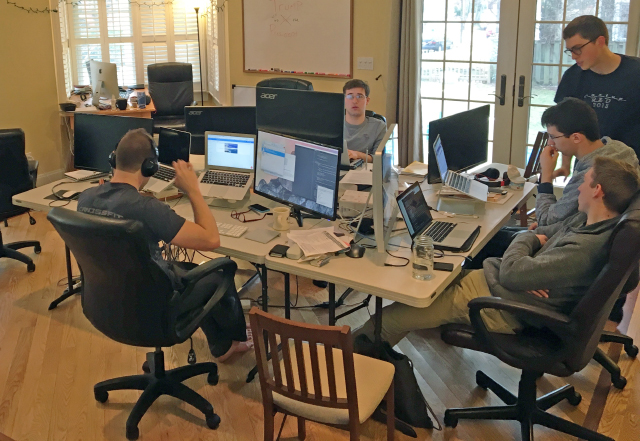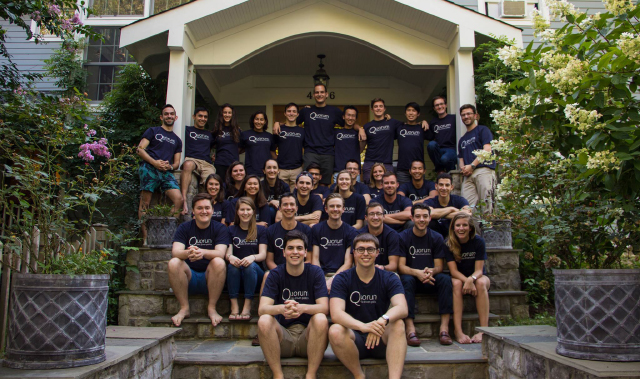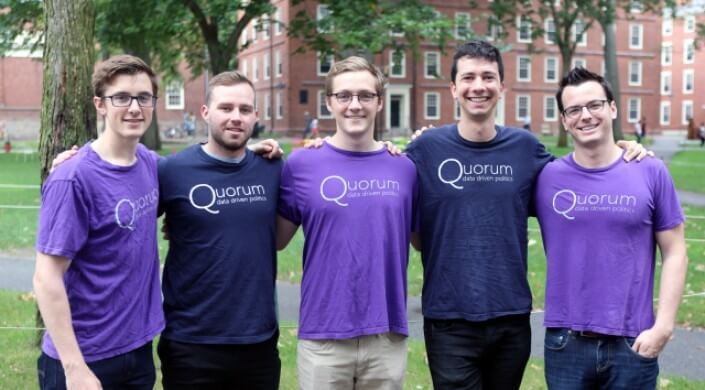News
Students (from left) Will Deuschle, A.B. ’19, Steven Kekacs, A.B. ’18, Jake Seaton, A.B. ’19, Leo Hentschker, A.B. ’19, and Ty Rocca, A.B. ’18, are back on campus, picking up their studies right where they left off, after leaving Harvard to work full-time for a legislative data analytics startup. (Photo by Adam Zewe/SEAS Communications.)
For Ty Rocca, arriving back on campus for the start of fall term felt a bit like waking up from an unusual dream.
Rocca, A.B. ’18, a computer science concentrator, left Harvard two years ago to work full-time for Quorum, a legislative data analytics platform founded by Harvard graduates Jonathan Marks, A.B. ’15, and Alex Wirth, A.B. ’15.
After helping cultivate the startup to a point of business stability, Rocca and peers Leo Hentschker, A.B. ’19, a math concentrator, Steven Kekacs, A.B. ’18, Jake Seaton, A.B. ’19, and Will Deuschle, A.B. ’19, computer science concentrators, returned to the John A. Paulson School of Engineering and Applied Sciences this fall, picking up their studies right where they left off.
“The school has been very flexible, so it was a great time to take a risk,” Rocca said. “When we started this adventure, the worst thing that could happen was that we would fail and have to come back to Harvard, which wouldn’t have been such a bad thing at all.”
The possibility of failure weighed heavily on the minds of Rocca and Kekacs in 2015 as they considered leaving school to work full-time for Quorum.
They had met Marks and Wirth through the swim team, and were drawn in by the startup’s concept—using data analytics to help public affairs professionals at private companies, trade associations, and non-profits streamline and strategize lobbying efforts.
Quorum began as an algorithmic web application that could identify the most influential members of Congress on a particular topic, eliminating the costly, timely, and frustrating process of bouncing between many offices to identify the best legislators to contact.
Rocca and Kekacs built new features, such as a Google-like search across Quorum’s expansive database. Rocca, initially an economics concentrator, taught himself to code to help build-out Quorum. The web application soon became a full-blown Congressional relations manager, enabling users to digitally store notes and share information with colleagues.
“We realized pretty quickly that there are a lot of different, simple tasks that interns or legislative staff members spend enormous amounts of time on that we could automate instantly,” Kekacs said.
As the company grew, co-founders flew between Cambridge and Washington, D.C. for meetings while teammates balanced Quorum coding sessions with Harvard coursework. Relocation began to feel inevitable, so in spring of 2015, Kekacs, Rocca, Seaton, and Hentschker decided to take time off, move to Washington, D.C., and work for Quorum full-time.
Packed into a rented house on the outskirts of the nation’s capital, the team wasted no time. They worked 18-hour days, pushing out new features with breathtaking speed. The team expanded Quorum to all 50 state legislatures, and they added collaborative tools like meeting notes, automatically updating spreadsheets, and a data-driven outbox feature to efficiently send personalized emails to policy makers, stakeholders, and advocates.

Quorum development team members are hard-at-work in the company's rented house on the outskirts of Washington, D.C. (Photo provided by Jake Seaton.)
“We moved very fast,” Rocca said. “A client would say ‘hey, have you ever thought of doing this?’ and then by the next morning, we would have added that feature. That first summer was a very move-fast-and-break-things time.”
It was also a period of team expansion— Deuschle joined as a summer intern in 2016 and then accepted a full-time position at Quorum, becoming the fifth student to pause his studies to work for the company full time.
And while the growing development team rolled out new features at a break-neck pace—Hentschker became nocturnal for a few weeks to manually run overnight algorithmic updates—the sales team doubled-down, and the firm’s customer base and revenue slowly began to grow.
“We were all doing everything we could to keep the company up and running smoothly,” Hentschker said.
By the end of this summer, Quorum boasted more than 60 distinct data sets and had expanded to Europe. The team was able to move out of their house on the edge of Washington and secure glitzy office space near Capitol Hill.
Looking around the glittering, glass-walled office, Rocca felt gratified, but it was also bittersweet; he and his peers decided the new office signaled the right time to return to Harvard. Though the adventure wasn’t lucrative—the team poured most revenue back into the growing startup—the experience was invaluable, Rocca said.
“I went from knowing nothing about programming to doing that as my major,” he said. “You learn, not only how to code, but see the relevancy of coursework, how important those lessons on coding consistently or following style guides actually become in practice. What’s nice about taking off time is that now I can go back and focus on learning those things better.”
The future of Quorum is bright, Kekacs said, and it is exciting to know they played a role in its growth. While it is fun to be back in class, he admits it hasn’t been easy to re-adjust to a world of lectures, problem-sets, and exams.
“The most jarring thing about being back on campus has been not waking up in the same house with these guys everyday,” Seaton said. “It may seem ironic, but one of the things I’m looking forward to most about being back at school is working together.”

The entire Quorum team in front of the startup's rented house in Washington, D.C. (Photo provided by Jake Seaton.)
Topics: Computer Science, Entrepreneurship
Cutting-edge science delivered direct to your inbox.
Join the Harvard SEAS mailing list.
Press Contact
Adam Zewe | 617-496-5878 | azewe@seas.harvard.edu



